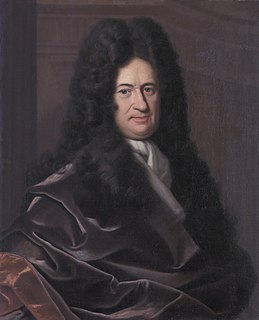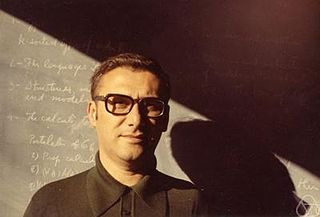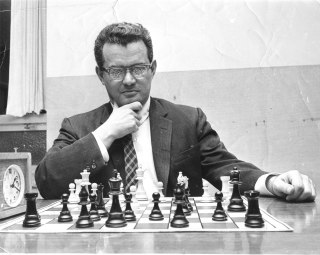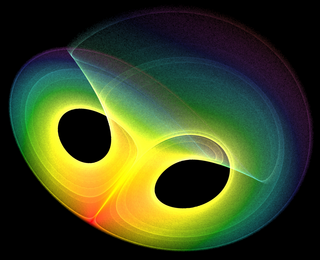Mathematical logic is a subfield of mathematics exploring the applications of formal logic to mathematics. It bears close connections to metamathematics, the foundations of mathematics, and theoretical computer science. The unifying themes in mathematical logic include the study of the expressive power of formal systems and the deductive power of formal proof systems.
In the philosophy of mathematics, constructivism asserts that it is necessary to find a mathematical object to prove that it exists. In classical mathematics, one can prove the existence of a mathematical object without "finding" that object explicitly, by assuming its non-existence and then deriving a contradiction from that assumption. This proof by contradiction is not constructively valid. The constructive viewpoint involves a verificational interpretation of the existential quantifier, which is at odds with its classical interpretation.

The history of calculus is fraught with philosophical debates about the meaning and logical validity of fluxions or infinitesimal numbers. The standard way to resolve these debates is to define the operations of calculus using epsilon–delta procedures rather than infinitesimals. Non-standard analysis instead reformulates the calculus using a logically rigorous notion of infinitesimal numbers.
The philosophy of mathematics is the branch of philosophy that studies the assumptions, foundations, and implications of mathematics, and purports to provide a viewpoint of the nature and methodology of mathematics, and to understand the place of mathematics in people's lives. The logical and structural nature of mathematics itself makes this study both broad and unique among its philosophical counterparts.
In the philosophy of mathematics, ultrafinitism is a form of finitism. There are various philosophies of mathematics that are called ultrafinitism. A major identifying property common among most of these philosophies is their objections to totality of number theoretic functions like exponentiation over natural numbers.

In mathematics, infinitesimals are things so small that there is no way to measure them. The insight with exploiting infinitesimals was that entities could still retain certain specific properties, such as angle or slope, even though these entities were quantitatively small. The word infinitesimal comes from a 17th-century Modern Latin coinage infinitesimus, which originally referred to the "infinite-th" item in a sequence. Infinitesimals are a basic ingredient in the procedures of infinitesimal calculus as developed by Leibniz, including the law of continuity and the transcendental law of homogeneity. In common speech, an infinitesimal object is an object that is smaller than any feasible measurement, but not zero in size—or, so small that it cannot be distinguished from zero by any available means. Hence, when used as an adjective, "infinitesimal" means "extremely small". To give it a meaning, it usually must be compared to another infinitesimal object in the same context. Infinitely many infinitesimals are summed to produce an integral.
Pluralism is a term used in philosophy, meaning "doctrine of multiplicity", often used in opposition to monism and dualism. The term has different meanings in metaphysics, ontology, epistemology and logic.
Dialetheism is the view that there are statements which are both true and false. More precisely, it is the belief that there can be a true statement whose negation is also true. Such statements are called "true contradictions", dialetheia, or nondualisms.
In mathematics, non-classical analysis is any system of analysis, other than classical real analysis, and complex, vector, tensor, etc., analysis based upon it.

Newton Carneiro Affonso da Costa is a Brazilian mathematician, logician, and philosopher. He studied engineering and mathematics at the Federal University of Paraná in Curitiba and the title of his 1961 Ph.D. dissertation was Topological spaces and continuous functions.
Smooth infinitesimal analysis is a modern reformulation of the calculus in terms of infinitesimals. Based on the ideas of F. W. Lawvere and employing the methods of category theory, it views all functions as being continuous and incapable of being expressed in terms of discrete entities. As a theory, it is a subset of synthetic differential geometry.

Walter Alexandre Carnielli is a Brazilian mathematician, logician, and philosopher, full professor of Logic at the State University of Campinas (UNICAMP). With a Bachelor and a Ms.C. degree in mathematics at the State University of Campinas in Campinas he obtained his Ph.D. in 1984 in the same university under the supervision of Newton da Costa and subsequently stayed as a PostDoc at the University of California at Berkeley as a Research Fellow, following an invitation by Leon Henkin.
Non-standard analysis and its offshoot, non-standard calculus, have been criticized by several authors, notably Errett Bishop, Paul Halmos, and Alain Connes. These criticisms are analyzed below.

Infinity is a concept describing something without any bound, or something larger than any natural number. Philosophers have speculated about the nature of the infinite, for example Zeno of Elea, who proposed many paradoxes involving infinity, and Eudoxus of Cnidus, who used the idea of infinitely small quantities in his method of exhaustion. This idea is also at the basis of infinitesimal calculus.

Albert Harold Lightstone (1926–1976) was a Canadian mathematician. He was one of the pioneers of non-standard analysis, a doctoral student of Abraham Robinson, and later a co-author with Robinson of the book Nonarchimedean Fields and Asymptotic Expansions.
This is a glossary of terms that are or have been considered areas of study in mathematics.
The following is a list of works by philosopher Graham Priest.
In logic, an infinite-valued logic is a many-valued logic in which truth values comprise a continuous range. Traditionally, in Aristotle's logic, logic other than bivalent logic was the norm, as the law of the excluded middle precluded more than two possible values for any proposition. Modern three-valued logic allows for an additional possible truth value and is an example of finite-valued logic in which truth values are discrete, rather than continuous. Infinite-valued logic comprises continuous fuzzy logic, though fuzzy logic in some of its forms can further encompass finite-valued logic. For example, finite-valued logic can be applied in Boolean-valued modeling, description logics, and defuzzification of fuzzy logic.









